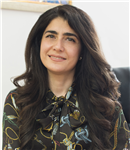
Takuhi Tavityan
Takuhi Tavityan holds a PhD in the field of Sociology, Anthropology and Cultural Sciences, a Master's degree in Journalism, Advertising and PR (Media Communication) and a Bachelor's degree in Ethnology. Dr. Tavityan is an expert in culture, religion, and ethnicity. Her scientific interests are in the fields of culture and cultural heritage, identity, and ethnic studies among others. Having graduated from Paisii Hilendarski University of Plovdiv, she joined prestigious international scientific organizations. Her passionate work on national and international projects have inspired her scientific publications as well as allowing her to acquire extensive experience in media and PR. In 2018 Takuhi became a member of the Plovdiv European Capital of Culture team. At present, she works in the Department of Culture, Archaeology and Cultural Heritage in Plovdiv Municipality.
Acknowledgments vii
Figures and Tables ix
Introduction xi
1
MEMORY AND IDENTITY. HISTORY AND MEMORY. 1
THEORETICAL CONSIDERATIONS AND DEFINITIONS
2
ARMENIANS IN BULGARIA DURING THE MIDDLE AGES. 34
SOURCES HISTORIOGRAPHY
3
PERIODICAL PRESS AND INTERNET SOURCES OF THE 103
ARMENIAN COMMUNITY – INSTRUMENTS FOR
CONSTRUCTING AND MAINTAINING HISTORICAL MEMORY
4
HISTORICAL MEMORY FROM THE PERSPECTIVE 141
OF SOCIAL SCIENCES
5
CONCLUSION 215
APPENDICES
Appendix 1. 225
Population profile according to faith and denomination
Appendix 2. 226
Catalogue of Armenian Personalities and Families Connected with Bulgaria in the Middle Ages, According to Sources and Scholarship
Appendix 3. 259
An ossuary as a source
Appendix 4. 263
Typikon
Appendix 5. 264
Data About Parties
Appendix 6. 265
Review of Regular and Occasional Rubrics in Periodicals: “Hayatert” (Armenian Newspaper), “Balkanyan Mamul” (Balkan Press), “Paros” (Pharos/Lighthouse), “Ardziv” (Eagle), “Bardez” (Garden), “Hayeli Ashharhi” (Mirror of the World)
Appendix 7. 268
Typology of the Places of Memory in Plovdiv
Bibliography 291
Index
6/18/2021
Dr. Tavityan's book presents the results of a comprehensive study about the role of historical memory in the process of Armenian identity construction in Bulgaria. Skillfully combining data and theoretical approaches to history, anthropology and sociology, she has extended her research over a wide time span (from the Middle Ages to the present day) to show how and to what extent knowledge and awareness of the past determine Armenians' contemporary understanding of the world and themselves. The rich sources which have been carefully selected and analyzed, as well as her field research, contribute to the validity and reliability of the conclusions drawn – i.e. the generators of historical memory are the family and language, but also the sense of belonging to the Christian community, institutions (school, church, media) scientific knowledge, and so on.
Prof. Maria Schnitter, D
Paisii Hilendarski University of Plovdiv